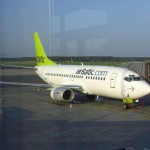The Latvian airline airBaltic has called on the Latvian government to reduce the VAT rate on overnight accommodations from 21% to 5%, and to do so immediately. This, the airline believes, will help to attract additional foreign tourists, ensure jobs in the sector, and increase national revenue by exporting tourism services.
Riga – The President and CEO of airBaltic, Bertolt Flick: „Since the 21% VAT rate was introduced on hotel services several months ago, the tourism sector has suffered damage. Many tourists know about the high prices and have chosen to avoid Riga as a destination. We believe that this sudden increase in the tax rate was completely pointless. A return to the old rate would mean an increased number of tourists. Overall income from the VAT would increase. We must also remember that airline passengers and foreign tourists pay in hard cash, not in food stamps. That is real money that begins to circulate in the Latvian economy.
„Tourism plays an important role in Latvia’s economic development, which is seen by the vivid example of the internationally appreciated Riga airport. Over the last five years, the airport has developed from a situation in which it had one million passengers and approximately 1,000 jobs to one which now ensures that services will be provided to some four million passengers in 2009, while the airport and its related companies will offer some 5,000 jobs. Over the course of five years, 4,000 new jobs have been created – two new jobs per day. I believe that this is a trend which should be expanded throughout the tourism sector, and it is the government’s job to do so by taking sensible decisions.“
Data from the Latvian Association of Hotels and Restaurants show that the situation in the tourism sector deteriorated substantially in the first quarter of 2009. Between 7,000 and 9,000 people lost their jobs, turnover at hotels and other accommodations dropped by 40.2%, the number of clients declined by 28.7%, and hotel occupancy in Riga retreated to the level that existed in 1999.





